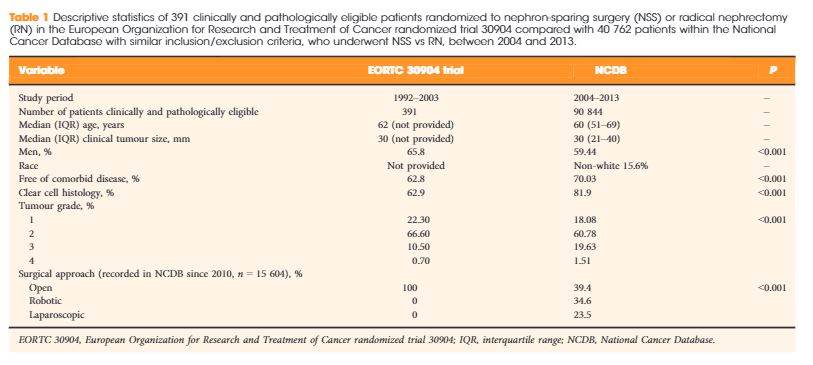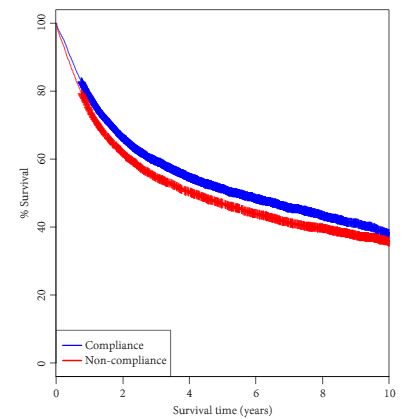
Editorial: PCa BCR after SRT – first look into risk stratification and prognosis
As salvage radiation therapy (SRT) is commonly offered as a treatment option to select patients with prostate cancer who have biochemical recurrence (BCR) after radical prostatectomy (RP), the uro-oncology community is in strong need of tangible data regarding patients who have a ‘second’ BCR after such therapy. The multi-institution team led by Tumati and Jackson [1] provides new insight into the outcomes of second biochemical failures, offering a novel risk stratification system with…

Article of the Month: Comparing survival after RN vs NSS in RCC
Every Month, the Editor-in-Chief selects an Article of the Month from the current issue of BJUI. The abstract is reproduced below and you can click on the button to read the full article, which is freely available to all readers for at least 30 days from the time of this post.
In addition to the article itself, there is an accompanying editorial written by a prominent member of the urological community. This blog is intended to provoke comment and discussion and we invite you to use the comment…

Editorial: Is overall survival not influenced by PN vs RN?
In this issue of the BJUI, Abdollah et al. [1] have for the first time tested the external validity of the only randomized clinical trial, 30904, run by the European Organization for the Research and Treatment of Cancer Genito-Urinary Group (EORTC GU) in the early 1990s, comparing cancer-specific survival and overall survival in patients with solitary renal masses of ≤5 cm and stage T1 and T2 in the TNM classification (in use at that time). The trial showed, as expected, that renal function…

Video: Centralisation of RC for bladder cancer in England
Centralisation of radical cystectomies for bladder cancer in England, a decade on from the ‘Improving Outcomes Guidance’: the case for super centralisation
Abstract
Objective
To analyse the impact of centralisation of radical cystectomy (RC) provision for bladder cancer in England, on postoperative mortality, length of stay (LoS), complications and re-intervention rates, from implementation of centralisation from 2003 until 2014. In 2002, UK policymakers introduced the ‘Improving…

Editorial: Examining the role of centralisation of radical cystectomy for bladder cancer
Despite the high risk of postoperative complications and/or death, radical cystectomy (RC) is currently considered as the standard of care for patients with muscle-invasive bladder cancer (MIBC) without clinical evidence of metastases at initial diagnosis. As an alternative, trimodality bladder-sparing therapy with a potentially more favourable toxicity profile has been developed over recent decades, but definitive surgery may provide better cancer control outcomes, especially in fit individuals.…

Article of the Week: Centralisation of RC for bladder cancer in England
Every Week, the Editor-in-Chief selects an Article of the Week from the current issue of BJUI. The abstract is reproduced below and you can click on the button to read the full article, which is freely available to all readers for at least 30 days from the time of this post.
In addition to the article itself, there is an accompanying editorial written by a prominent member of the urological community. This blog is intended to provoke comment and discussion and we invite you to use the comment…

Article of the Week: Association between T2DM, curative treatment and survival in localized PCa
Every Week, the Editor-in-Chief selects an Article of the Week from the current issue of BJUI. The abstract is reproduced below and you can click on the button to read the full article, which is freely available to all readers for at least 30 days from the time of this post.
In addition to the article itself, there is an accompanying editorial written by a prominent member of the urological community. This blog is intended to provoke comment and discussion and we invite you to use the comment…

Editorial: Selecting patients for PCa treatment: the role of comorbidity
The risk of dying from prostate cancer is strongly influenced by competing causes related to age and comorbidity. In the past, indiscriminate screening and treatment of prostate cancer in men with limited life expectancy have been heavily criticized. In the SPCG-4 study, Bill-Axelson et al. [1] showed that patient age significantly modified the likelihood of benefit from radical prostatectomy: while patients aged <65 years at the time of treatment saw significantly decreased risk of overall…

Video: Association between T2DM, curative treatment and survival in localized PCa
Association between type 2 diabetes, curative treatment and survival in men with intermediate- and high-risk localized prostate cancer
Abstract
Objective
To investigate whether curative prostate cancer (PCa) treatment was received less often by men with both PCa and Type 2 diabetes mellitus (T2DM) as little is known about the influence of T2DM diagnosis on the receipt of such treatment in men with localized PCa.
Subjects and Methods
The Prostate Cancer database…

Article of the Week: Safety and efficacy of 2-weekly cabazitaxel in mCRPC
Every Week, the Editor-in-Chief selects an Article of the Week from the current issue of BJUI. The abstract is reproduced below and you can click on the button to read the full article, which is freely available to all readers for at least 30 days from the time of this post.
In addition to the article itself, there is an accompanying editorial written by a prominent member of the urological community. This blog is intended to provoke comment and discussion and we invite you to use the comment…
